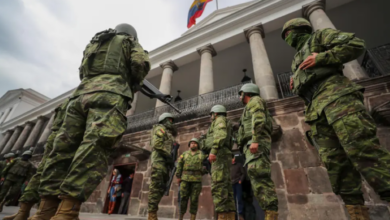Canada and Mercosur: a new FTA?
The foreign ministers of the Latin American bloc met with the Canadian Minister of Commerce in Asuncion, and formally initiated negotiations for an FTA

On Friday, March 9, in Asunción, Paraguay, formal talks began between the MERCOSUR countries and Canada for the signing of an FTA (Free Trade Agreement). In a joint statement, the parties' foreign ministers expressed the desire to obtain a Canada-Mercosur comprehensive trade agreement.
Leer en español: Canadá y Mercosur: ¿nuevo TLC?
As the representative of Canada was the Minister of Commerce Francois-Philippe Champagne, while, on the Mercosur side, the Paraguayan Foreign Minister Eladio Loizaga, accompanied by the Argentine Jorge Faurie, the Brazilian Aloysio Nunes, and the Uruguayan Rodolfo Nin Novoa were part of it. Brazil, in addition, chose to take its trade minister Marcos Jorge.
Champagne experienced the start of negotiations as a victory, and declared that in a week Canada signed two agreements, referring to the signing of the Trans-Pacific Agreement (TPP) and the joint declaration with Mercosur.
Leja em português: Canadá e Mercosul: novo TLC?
The first round of negotiations will take place in Ottawa from March 20 to 23. In this round the topics on which the negotiations will focus will be put on the table: goods and services, labor legislation, environment, commerce, gender, and SMEs and micro SMEs.
Canada's interest
The Canadian government, led by Prime Minister Justin Trudeau, is focused on achieving free trade agreements that diversify its economic-trade relations in a context in which the future of NAFTA (North American Free Trade Agreement) is uncertain. Canada allocates three quarters of its exports to the United States, according to Nosis Trade. This is how the Trudeau administration went out looking for business partners with the objective of taking advantage of the moment of uncertainty and obtaining benefits, which could also be a negotiation tool with its NAFTA neighbors. The commercial agreement with the European Union (EU) was already materialized and an agreement with China and India is in the preliminary stage of the negotiation. Canada is deploying its diplomacy to expand its margins of maneuver in economic and commercial matters. According to Statistics Canada, the Canada-MERCOSUR bilateral exchange totals 8 billion Canadian dollars, something like 6 billion 380 million US dollars.
Canadian officials said that Trudeau's visit to Argentina in 2017 generated a good bond with President Mauricio Macri. Both discussed what the central issues would be during 2018, since Canada will preside over the G7, while Argentina will preside over the G20. Given that Macri is the one leading the negotiations with the EU to reach an agreement with MERCOSUR, coupled with the domestic need for foreign investment, Canada expects strong Argentine support.
The objective of Canada is to liberalize the barriers of goods and services, while it is a traditional position of MERCOSUR to prioritize goods and not services. Canada is also interested in discussing labor and environmental laws, health issues, gender and safety.
Where does the negotiation come from?
In 1998, Canada and MERCOSUR members signed an understanding of cooperation in trade and investment, together with an action plan. In 2004, the leaders of Brazil and Canada issued a joint statement calling for deepening trade relations. In 2005, the first preliminary discussions took place at the first MERCOSUR – Canada dialogue meeting. In 2011 in Paraguay, exploratory meetings begin to encourage commercial relations. It is only in 2017 when a technical meeting about a possible commercial agreement is given.
In other words, this negotiation between Canada and MERCOSUR has a long history. Maybe the current situation contributes to close this stage. For Canada, MERCOSUR is an alternative to a stagnation in the reformulation of NAFTA. For MERCOSUR is the possibility of closing an agreement that is also a letter of introduction in the negotiations with the EU. According to the Argentine chancellor, Faurie, "If we do not close this year (the agreement) we will not close anymore". Maybe MERCOSUR can close one of the two agreements that have cost so much time and resources.
Latin American Post | Jonathan Carné
Translated from "Canadá y Mercosur: ¿nuevo TLC?"





